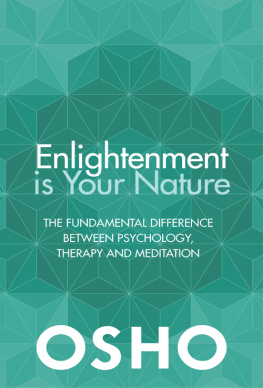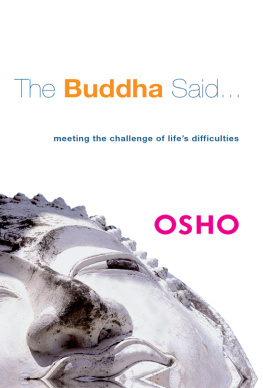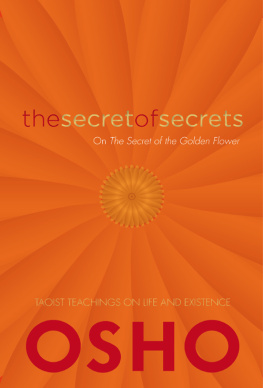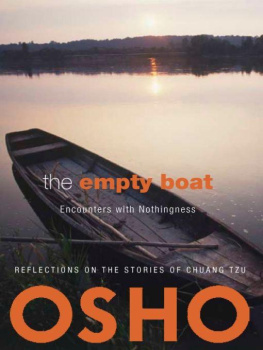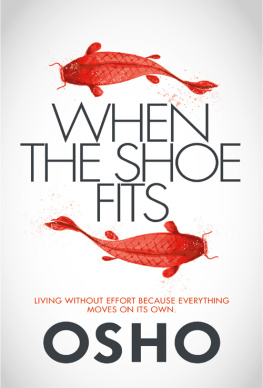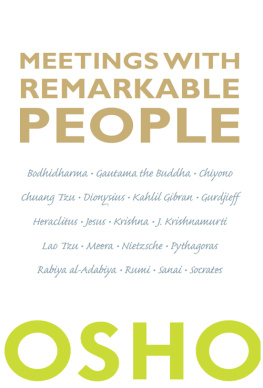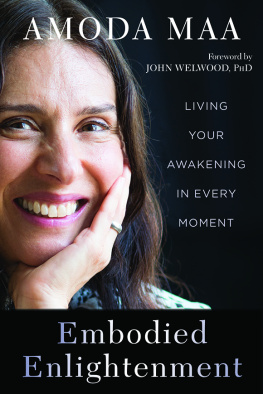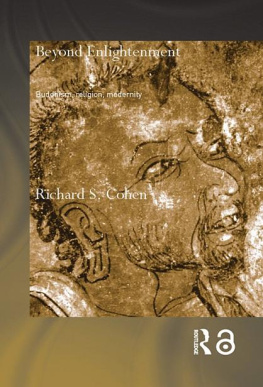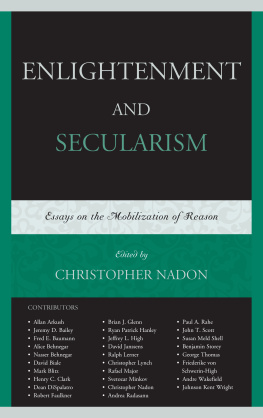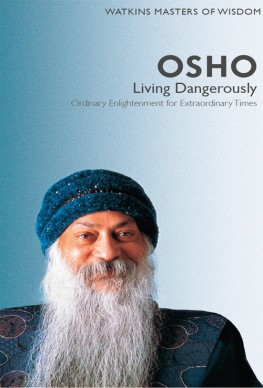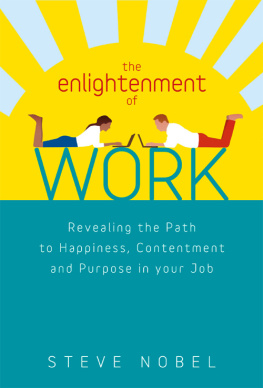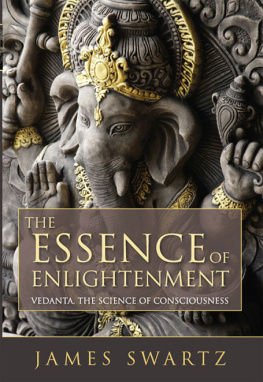Enlightenment is Your Nature
Enlightenment
is Your Nature
THE FUNDAMENTAL DIFFERENCE
BETWEEN PSYCHOLOGY,
THERAPY AND MEDITATION
OSHO

Preface
On the Neurosis of Becoming Human
Why is modern man so neurotic? It is because modern man is, for the first time, becoming human. The past of humanity is not that of human beings. Man has existed up to now as a crowd, not as individuals; man has existed in collectivities. The individual is being born; hence the modern man is very neurotic. It is a good indication; it is a great revolution that human consciousness is going through.
What is neurosis really? Neurosis is an indefinite state of mind, undecided, indecisive. To be this, or to be that? All outer definitions have disappeared, all props have been taken away. Ones identity is very fragile everyone knows it.
In the past it was very easy to answer the question, Who am I? Hindu, Christian, Mohammedan, Indian, Chinese, Tibetan, white/black, man/woman things were clear, people knew who they were. Now it is not so clear; all those labels have disappeared. Everybody is standing nude, with no labels, and a great anxiety arises. Everybody has to define himself.
The work of defining oneself was done by others before parents, teachers, priests, politicians. They were the authorities, the infallible authorities. You could be dependent easily; you did not need to think about things. Everything was chewed for you by others and given to you; you were spoon-fed.
Now man is becoming adult, mature. You have to work out your own identity. It is not so easy; only very intelligent people will be able to avoid neurosis. Utter intelligence will be needed; great silence, a great capacity to get out of the mind and its traps, will be needed in the future. And it will be needed more and more.
In the past, intelligence was not a great value in fact, to be mediocre was more valuable. The mediocre person was always a fit with the society, and the talented person was always a misfit. No society in the past has ever liked people who were geniuses, because geniuses create trouble.
When a Buddha is alive he is a nuisance. His genuine intelligence disturbs the mediocre mind; his utter intelligence disturbs the stupid people. His individuality, his freedom, his rebellion hits hard on the mind of the crowd because the crowd does not want individuality. A crowd does not want uniqueness, the crowd simply wants to belong. It simply wants to be not responsible for anything. It wants to be part of a big crowd so the responsibility is always somewhere else the Pope decides, the president decides, you need not bother about it. It is not for you to ask why, you are only to do and die.
In the modern mind is the first glimpse of individuality; hence, neurosis. In the past, all answers were fixed; one was not required to search for answers. God was there, heaven was there, the theory of karma was there, everything was so clear-cut; you could live with all those formulations very easily. Now you dont know; nothing is certain any more. A great paralysis is happening. This paralysis can either kill humanity or become a great, transforming, quantum leap.
I have heard that in a well-known experiment in learning theory, rats were trained to jump from a stand toward a pair of cards. There was a white card fixed in place if the rats jumped toward it they fell to the ground. But if the rats jumped toward the other card, a black card, the card would fall and the rats could eat food that the experimenter had placed behind the card. The rats easily learned which card was which. If the cards were shifted around, they would learn to jump to the black card, wherever it happened to be.
But in the next stage of the experiment, the white and black cards were replaced by cards that successively approached a neutral grey. At some point the greys would become so similar that the rats could not distinguish between them. In this ambiguous situation, they refused to jump; they became almost paralysed, tense and neurotic.
This is the situation of man a very potent situation, a pregnant situation. If people are just rats they will go really neurotic and they will commit suicide.
But man is not just a rat notwithstanding what B F Skinner and other so-called psychologists say, man is not a rat. If there is a possibility that people might take this challenge and become more integrated, their neurosis will appear only in the interval. Sooner or later, they will know how to deal with it. Without authorities, without God, without Bibles and Vedas, they will fall upon their own consciousness. They will start functioning spontaneously, moment to moment, without any ready-made answers. Then the neurosis will disappear and not only the neurosis, but the mob mind also. For the first time there will be beauty, grandeur, dignity.
In the past, man was not dignified. Yes, once in a while a Buddha happened, once in a while a Christ walked on the earth but that was only once in a while. What about the millions of people who lived and died without knowing any taste of freedom, without ever knowing who they were? They believed they were Jews and died; they believed they were Hindus and died. They believed they were just their bodies and died. They never knew who they really were they never came across the inner space. Unless you come across that inner space you live an undignified life. You live like rats and you will die like dogs.
To be human is risky. The risk is, you will have to pass through a kind of neurosis. Before you can become centred in your own being, you will have to go through a kind of un-centring. Zen people say: before you start meditating, mountains are mountains and rivers are rivers. When you meditate, when you go deep in meditation, mountains are no longer mountains and rivers are no longer rivers. But if you go on, if you persist and reach the highest peak of meditation, then again mountains are mountains and rivers are rivers.
This is one of the most significant statements ever made. In the middle, everything becomes confused.
This is a century of great transformation. Man will either fall back... and that is happening. Thats why Adolf Hitler, Joseph Stalin, Benito Mussolini, Mao Zedong and people like these become so important. Why? Because they are authoritative; they say, You dont know who you are? We will supply you with the answers. They are infallible people; they know everything. Adolf Hitler is absolutely certain; people start falling in line with him and they start following him.
The old gods have disappeared. It is very easy for Joseph Stalin or Mao Zedong to lead people because people cannot live without gods, people cannot live without priests. People cannot live on their own, this is the problem. So, during these past few decades man has seen two things happening: very few people have risen toward individuality and have become peaks like Everest. But many more have fallen back, have regressed and become fascists, communists, religious fundamentalists and there are so many brands available.
And whenever a country is very confused, an Adolf Hitler is bound to arrive. It was not just an accident that Germany became a victim one of the most intellectual countries in the world, a country of professors and scholars, thinkers and scientists. Why did a country of so many intelligent people become a victim of this madman? The reason was that these intelligent people professors, philosophers could not supply the ready-made answers. They were too polite, they were too hesitant, they were too humble, they were too intelligent. They could not shout, they only whispered and people needed slogans, not whisperings.
Next page
